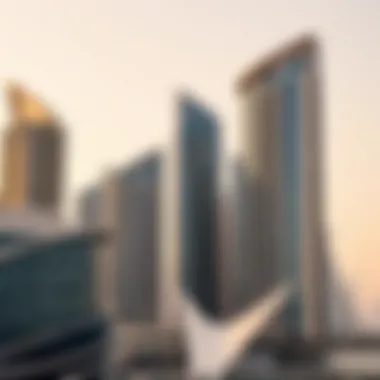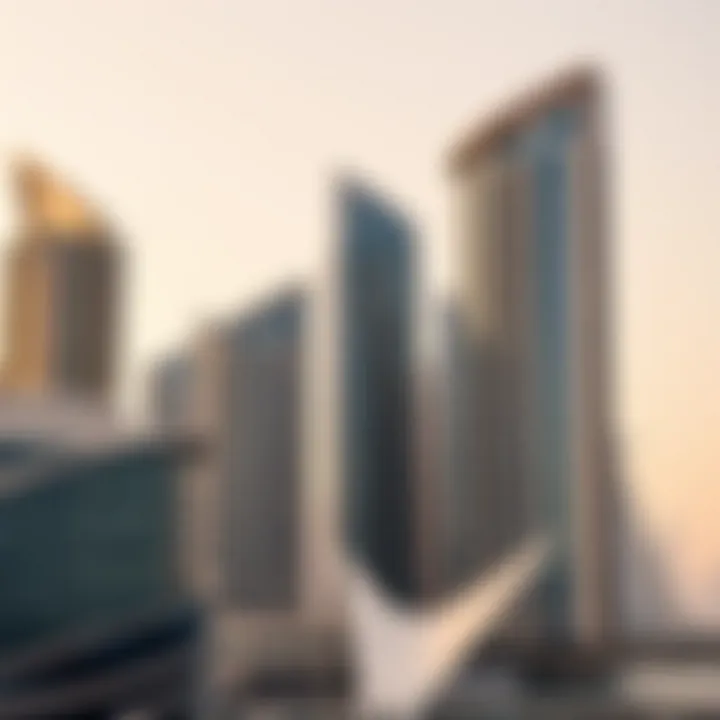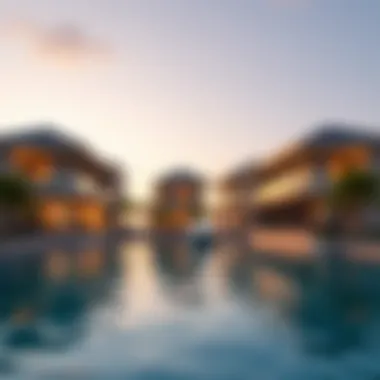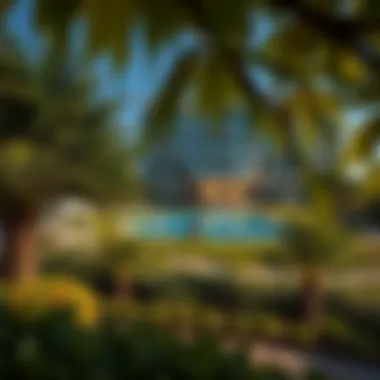Discovering Distinct Real Estate in Dubai


Intro
Dubai's real estate market stands as a shining example of innovation and ambition. Known for its towering skyscrapers and luxurious living spaces, the city continuously draws attention from homebuyers and investors alike. Yet, what truly distinguishes Dubai's property landscape are the unique opportunities that often lie hidden beneath the surface. This article delves into the intricate dynamics of Dubai's real estate environment, showcasing not just popular neighborhoods but also lesser-known gems that promise potential. From groundbreaking architectural designs to evolving cultural influences, we will uncover the factors at play that shape this vibrant market.
Market Analysis
A careful examination of the market reveals several trends that impact property investments. In recent years, Dubai has seen a notable shift in buyer preferences, with a growing inclination towards sustainable and eco-friendly developments. As expats and locals alike embrace greener living spaces, developers have recognized this demand, leading to a surge of new projects aimed at sustainability. This shift is not just a passing fad; local regulations are increasingly favoring energy-efficient designs, pushing investors to adapt to this new reality.
Current Trends in Dubai Real Estate
The dynamics of the market are forever evolving. For instance, the demand for luxury villas is witnessing a surprising boom, especially in areas such as Palm Jumeirah and Emirates Hills. On the flip side, there is also an increase in interest for affordable housing solutions that cater to the burgeoning population of middle-income expatriates.
Some other key trends include:
- Rise of Mixed-Use Developments: Properties that combine residential, commercial, and leisure spaces are gaining traction.
- Smart Home Technologies: Buyers are looking for homes equipped with advanced technology for convenience and security.
- Community Living: There is a notable preference for complexes that offer a sense of community and shared amenities.
"Dubai's property market is a reflection of its broader ambition; it's about meeting the desires of a diverse, ever-changing populace."
Price Dynamics and Forecasts
Looking into the pricing structures, there's a mixed bag of indicators. While luxury properties have maintained their high price points, there’s been a moderate dip in prices for certain types of apartments, particularly those in less desirable locations. Analysts anticipate a stabilization period, with modest growth projected for the next few years. Understanding these movements is essential for anyone looking to navigate the market effectively.
According to recent reports, the expected trends include:
- Luxury Segment Resilience: Continued demand for high-end properties despite broader economic fluctuations.
- Emerging Areas Gaining Value: Neighborhoods like Dubai Creek Harbour are predicted to experience significant appreciation as urban development continues.
Investment Opportunities
As we dissect the investment landscape, it becomes evident that Dubai remains a lucrative location for both seasoned and novice investors. Not only do unique properties exist, but also avenues for high-return investments that provide opportunities for growth in the long run.
Insights on High-Return Investments
Investors are increasingly looking beyond traditional properties. A shift towards securing units in off-plan developments or in areas marked by upcoming infrastructure projects can yield substantial returns. Investing in short-term rentals is also gaining steam as more tourists flock to Dubai, fueling demand for vacation rentals. This approach allows investors to capitalize on peak seasons while maintaining an asset that appreciates over time.
Emerging Neighborhoods for Expatriates
Specific neighborhoods are particularly appealing to expatriates, offering both a mix of comfort and community. Areas that stand out include:
- Jumeirah Village Circle: Known for its family-friendly environment, affordable options, and green spaces.
- Dubai Marina: A vibrant area with stunning views and a bustling lifestyle that attracts both singles and families.
- Arabian Ranches: A close-knit community that offers spacious homes and is favored by those seeking a quieter life.
Understanding the Unique Real Estate Market in Dubai
The real estate market in Dubai stands out as one of the most dynamically evolving sectors around the globe. For homebuyers, investors, and real estate agents alike, comprehending the nuances of this market is crucial. This understanding can pave the way for informed investments and even personal purchases that yield significant returns. The role of local culture, regulatory frameworks, and architectural diversity cannot be overstated; they form the very fabric of this landscape.
Historical Context
Dubai's real estate journey is rooted deeply in a transformation from a quiet fishing village to a global metropolis. This change accelerated dramatically in the 1980s when the government initiated a series of ambitious projects aimed at diversification away from oil dependency. Landmark developments like the Burj Khalifa and the Palm Jumeirah became icons of this new era. The historical context provides a lens through which the current market can be viewed.
Notably, the established laws around property ownership have evolved, allowing foreign investment. This ease of access encourages a melting pot of cultures and influences, which has contributed to the distinctive character of Dubai's market. With this rich history behind it, the unique characteristics of the market can be appreciated in light of the socio-economic forces at play.
Current Market Dynamics
In the present day, Dubai's real estate market exhibits both vibrancy and volatility. On one hand, luxury properties continue to attract global attention, with penthouses in Downtown Dubai commanding astronomical prices. On the other hand, there’s an increasing trend toward more affordable housing to cater to the growing expat community. The balancing act between luxury and affordability shapes the market’s dynamics, making it attractive for a variety of investors.
The market isn't just about residential buildings; commercial real estate is also on the rise. With businesses flocking to the UAE for its strategic location and favorable business conditions, the demand for office spaces in crucial areas like Business Bay remains high. Additionally, government initiatives aimed at attracting foreign investment keep the market lively, with policies that are often tailored to suit new entrepreneurs and established companies alike.
Influence of Global Trends
Global trends significantly impact the local scene, especially as real estate becomes increasingly interconnected due to technology and the rise of remote work. The shifts in global economic conditions, such as fluctuating oil prices or geopolitical tensions, also reverberate through the property market.
Moreover, the growing focus on sustainability reflects global priorities influencing Dubai's development trajectory. Projects like the sustainable city and green building initiatives are some answers to worldwide calls for environmental responsibility. As these global trends continue to intertwine with local elements, they create a unique atmosphere in Dubai's real estate landscape, enriching the opportunities available to astute buyers and investors alike.
"Understanding the historical and current context of Dubai's real estate market is not just fascinating but imperative for anyone looking to buy property here."
By navigating through historical developments, understanding current dynamics, and keeping an eye on global trends, stakeholders can make more competitive decisions. Whether it’s a rental unit in a bustling area or a plush villa overlooking the sea, tapping into this understanding can unlock lasting potential in the market.
For more on the historical developments in Dubai, you may visit Wikipedia.
For current market reports, a useful resource is the Dubai Land Department.
To explore global real estate trends, check out resources like the International Monetary Fund.
Identifying Unique Property Types
In the bustling metropolis of Dubai, where innovation and tradition intertwine, identifying the unique property types becomes crucial for anyone looking to invest or buy. This segment of the real estate market offers potential buyers and investors a spectrum of options that cater to diverse tastes and needs.
Focusing on unique property types not only widens the horizon for investment opportunities but also helps in understanding market demands and preferences. Properties here often reflect modern architecture, luxurious amenities, and a vibrant lifestyle, making them attractive not just for locals but for expatriates and foreign investors.
Luxury Villas
Luxury villas in Dubai are often the epitome of opulence. These properties are designed with an acute attention to detail, blending comfort with extravagance. Nestled in high-end localities such as Emirates Hills and Jumeirah, these villas typically come equipped with sprawling gardens, private pools, and state-of-the-art home automation systems.
Investing in luxury villas offers considerable returns on investment, particularly in a market where high-net-worth individuals seek to acquire exclusive real estate. However, potential buyers should consider the maintenance costs and location desirability, as these factors can significantly influence the property's resale value.
Contemporary Apartments
The contemporary apartment scene in Dubai is a vibrant area marked by innovative design and multifunctional spaces. Building styles emphasize sustainability and minimalism, which resonate with modern urban lifestyles. From luxurious penthouses in Downtown Dubai to chic studios in Dubai Marina, the city offers a range of contemporary apartments to choose from.
Rental demand for these properties remains high, offering investors a steady income stream. The key here is to align the property choice with market trends. For example, younger renters often prefer amenities like gyms and shared spaces conducive for social interaction.
Commercial Real Estate
Dubai has become a hub for businesses and commerce, making commercial real estate a pivotal area of investment. Properties range from office spaces in Dubai Silicon Oasis to retail establishments in The Dubai Mall. This segment is characterized by attractive yields, particularly in bustling localities.
Investors must conduct thorough market research, assessing foot traffic and nearby amenities, which can affect the success of a commercial venture. Comprehending how local laws can influence business operations is also important.


Mixed-Use Developments
Mixed-use developments are gaining momentum in Dubai, blending residential, commercial, and recreational spaces under one roof. These properties not only offer convenience but also create vibrant communities. An example would be the bustling City Walk, which combines retail, dining, and residential spaces in one lively area.
Investing in such developments often leads to increased property values due to their multifunctional appeal. Buyers are not just purchasing real estate; they are investing in a lifestyle. However, understanding the implications of living in mixed-use buildings is essential, including noise levels and foot traffic.
Through recognizing and understanding these unique property types, buyers and investors can make informed decisions that align with their personal goals and market opportunities within Dubai's dynamic real estate framework.
Key Neighborhoods Offering Unique Properties
When diving into the vibrant real estate market of Dubai, understanding the neighborhoods is instrumental. Each area has its own unique flavor, catering to different tastes, lifestyles, and investment objectives. Here, we explore specific locales renowned for their distinctive properties that not only reflect the cultural ethos of Dubai but also provide substantial investment prospects.
Dubai Marina
Dubai Marina stands out as a gem in the city’s skyline. Known for its picturesque waterfront, it offers a mix of luxurious high-rises and cozy apartments overlooking the marina. The allure here goes beyond aesthetics; it’s about the lifestyle.
Living in Dubai Marina isn’t just about the living space. It’s a haven for those who cherish an active lifestyle, with ample walking paths, brimming cafes, and a bustling nightlife. The marina area is often animated with events and activities, ensuring residents never have a dull moment. Additionally, being a hub for expats contributes to its eclectic community feel.
An investment in this neighborhood is not only appealing due to the breathtaking views but also its potential for rental income. The demand for properties in Dubai Marina remains high, fueled by its popularity with tourists and long-term residents alike.
Downtown Dubai
Downtown Dubai is often referred to as the heart of the city, a bustling hub that boasts architectural icons like the Burj Khalifa and the Dubai Mall. The properties here are simply stunning, offering a slice of luxury and convenience. Each building seems to tell a story, with design elements that celebrate both modernity and traditional Arabic motifs.
Investors looking for unique properties in this area will find various options: from penthouses with panoramic views to ultra-modern apartments catering to affluent professionals. However, owning a piece of Downtown Dubai isn’t just about a luxurious address. It’s about being surrounded by a vibrant lifestyle, with fine dining, entertainment, and shopping at one’s doorstep.
"Downtown Dubai is where urban sophistication meets Arabian allure."
A key benefit of investing in Downtown Dubai is its strong historical performance in the real estate market, often resulting in high return on investment. Additionally, its role as a tourist hotspot further solidifies its position as a desirable location.
Jumeirah Beach Residence
Jumeirah Beach Residence (JBR) is synonymous with coastal living in Dubai. The area is characterized by its laid-back atmosphere combined with luxurious beachfront properties. Those seeking a blend of leisure and luxury will find themselves right at home in this neighborhood.
One of the highlights is the stunning public beach, which attracts both locals and visitors. Properties here have direct beach access and breathtaking views of the Arabian Gulf. The residences often include amenities like pools, gyms, and proximity to trendy shops and eateries that reflect the contemporary lifestyle of Dubai.
Investing in JBR may come with a higher price tag, but the demand for rental units is consistently high. The area's appeal to tourists and expatriates ensures that properties remain in demand, further solidifying JBR as a prime investment option.
Palm Jumeirah
The Palm Jumeirah, an engineering marvel, represents luxury at its finest. This man-made island hosts some of the most extravagant villas and apartments in Dubai. Living here is about exclusivity and bespoke experiences. Each property often comes with unique features, such as private beaches or yacht docking facilities.
In addition, the Palm is home to high-end hotels and restaurants, making it a prime destination for those who seek a resort-like lifestyle right at their doorstep. Investing in properties here is not just about immediate returns; it’s about embracing a lifestyle that few others can experience, making it both a personal and financial investment.
Furthermore, the unique layout of the Palm ensures that many properties enjoy beachfront views, a factor that significantly enhances their value over time.
The Role of Cultural Influences in Real Estate
In Dubai, where skyscrapers touch the clouds and lifestyles embody luxury, cultural influences resonate deeply within the realm of real estate. The city is not just a melting pot of diverse backgrounds but also a landscape shaped by its rich heritage. Delving into these cultural elements offers insights that go beyond mere aesthetics or price points; it unveils how traditions, customs, and community dynamics mold the properties and investment strategies.
Architectural Traditions
Dubai’s architecture stands as a testament to its history and cultural narratives. The city seamlessly blends traditional Islamic motifs with contemporary design. The iconic designs of the Burj Khalifa and the stunning curves of the Opus building speak to a future-oriented mindset, while properties adorned with mashrabiya and geometric patterns hark back to the city’s Arab roots.
These architectural traditions do not merely exist in isolation—they influence property desirability and valuation. Buyers often seek homes that reflect a sense of identity, asking themselves whether they resonate with the neighborhood’s cultural aesthetics. For instance, neighborhoods like Al Fahidi maintain an old-world charm that can attract both local and foreign buyers seeking that authentic Dubai experience.
Local Customs in Property Ownership
Understanding local customs is crucial for anyone looking to invest in Dubai’s real estate market. The UAE operates under a unique legal framework that often contrasts with Western practices. For instance, a common misconception is that all types of ownership are available to foreign investors. However, freehold ownership is restricted primarily to designated areas, and most expats often opt for leasehold agreements.
Local customs also play a significant role in negotiations, where informal discussions and building personal relationships can lead to successful transactions. These dynamics underline the importance of cultural familiarity, which can afford more advantages than an understanding of legalities alone.
"Understanding local customs can be just as valuable as knowing the laws—for in the emotional landscape of property ownership, trust is currency."
Moreover, significant cultural considerations involve the importance of familial tradition in investing. While European investors may think of property as a commodity, in many Emirati families, a home can embody legacy, heritage, and emotional ties.
Expatriate Communities
Expatriate communities add yet another layer of complexity and vibrancy to Dubai's real estate market. With a large portion of the population comprising foreigners, understanding their preferences and needs is vital. Properties that provide community features, such as cultural familiarities or social networking opportunities, are likely to attract these individuals. Villas in Jumeirah, for instance, often see interest from Western expatriates interested in spacious homes that resemble traditional styles in their home countries.
These communities also influence where new developments spring up; developers often cater to the diverse needs by creating mixed-use spaces that encompass shopping, leisure, and living. This concept not only draws in foreign investors but also promotes inclusivity, making Dubai a truly global city.
In summary, as the real estate market in Dubai continues to thrive, the importance of understanding cultural influences cannot be overstated. They serve as crucial touchstones for both buyers and sellers in an often turbulent market, shaping decision-making processes and property values alike.
Investment Strategies for Unique Real Estate
In the vibrant world of Dubai's real estate, adopting the right investment strategies can be the key to unlocking exceptional opportunities. Investers who understand the nuances of this dynamic market can reap significant rewards, whether through residential, commercial, or mixed-use properties. The strategies employed not only determine the type of properties to acquire but also influence long-term wealth generation. Adopting a tailored approach involves careful consideration of various elements such as investment duration, financing avenues, and market analysis.
Long-Term Versus Short-Term Investments
When diving into Dubai's real estate, investors often find themselves weighing the pros and cons of long-term versus short-term investments. Long-term investments typically involve purchasing properties with the intention of holding them for several years. This approach can lead to substantial appreciation in value, particularly in sought-after neighborhoods like Downtown Dubai or Palm Jumeirah. Moreover, long-term rentals can provide a steady stream of passive income, creating a security net for investors.
Conversely, short-term investments usually revolve around the popularity of property flipping or short-term rentals, especially in tourist-filled areas. This strategy might yield faster returns, especially with the right timing and marketing of properties on platforms like Airbnb or Vrbo. However, it requires a keen understanding of local laws regarding short-term rentals and the associated management responsibilities.
"In the world of real estate, time can be as valuable as gold. Understanding when to dive in or pull back can make all the difference."
To summarize, the choice between long-term and short-term investments hinges on an investor’s goals, risk tolerance, and market behavior.
Leveraging Financing Options
Financial strategies play a crucial role in shaping an investor’s real estate journey. Dubai offers a plethora of financing options designed to cater to various needs. Leveraging these options effectively not only enhances purchasing power but also strategically positions investors for success.
For many, securing a mortgage can be a practical route. Institutions like Emirates NBD and ADCB provide tailored mortgage solutions. Low-interest loans make property acquisition more feasible, allowing individuals to invest in high-value assets without needing to pay the total price upfront. Additionally, understanding the ins and outs of off-plan purchases can further maximize investment potential, as buying during the developmental phase often comes with significant discounts.


Furthermore, investors may want to consider collaborative financing, where partnerships can share the risks and costs involved in larger developments. This option can prove particularly beneficial in a market like Dubai, where multi-million dollar commercial properties are commonplace.
Analyzing Market Trends
To make informed decisions in the real estate landscape, comprehensively analyzing market trends is paramount. Investors must keep a pulse on fluctuations in demand, supply, and pricing across different regions in Dubai. Emerging neighborhoods could provide a goldmine of opportunities, especially as the city continues to expand.
Utilizing data from reliable sources, such as the Dubai Land Department and property analysis firms, can offer insights into price trends, sales volume, and rental yields. Investors benefit from understanding seasonal cycles and how global factors, like economic shifts or changes in tourism patterns, can impact the local market.
A high level of awareness about upcoming government initiatives, such as new infrastructural projects, can also be pivotal. For instance, the introduction of the Dubai 2040 Urban Master Plan aims to enhance livability, thus promoting property value growth in the city.
Ultimately, a combination of diligent market trend analysis and a proactive investment approach ensures that investors are not left high and dry in the face of this ever-evolving real estate landscape.
Understanding and strategically leveraging investment opportunities in Dubai can provide substantial benefits, but it requires a careful and informed approach. As investors become more educated about the realm of unique properties, they can navigate the complexities of Dubai's real estate market with confidence.
Sustainable Developments in Dubai
Sustainable developments in Dubai represent a vital shift in the real estate market landscape. With the push for environmental consciousness in urban planning, Dubai stands at the forefront of integrating sustainability into its architectural designs and developments. The importance of this shift cannot be overstated, as it not only enhances the quality of life for residents but also contributes to the city’s long-term viability and appeal to investors.
Eco-Friendly Buildings
Eco-friendly buildings are not just a trend; they're rapidly becoming the norm in Dubai. These structures prioritize energy efficiency, utilize renewable energy sources, and often incorporate green spaces. For example, the Dubai Sustainable City is a development that embodies this approach. It features energy-efficient homes powered by solar technology and a focus on sustainable living. Besides being environmentally responsible, such buildings offer lower utility costs, making them an attractive choice for buyers looking for economic features as well.
Elements like high-performance insulation and smart home technology minimize energy consumption, while water-saving fixtures enhance sustainability. As the demand for environmentally friendly residences grows, builders are keen to adapt to these preferences.
Innovations in Sustainability
Innovation is the name of the game when talking about sustainability in Dubai. Developers are now employing cutting-edge technologies to reduce their carbon footprint significantly. For instance, some new projects are being designed with waste management systems that convert waste into energy.
Additionally, the use of Building Information Modelling (BIM) not only improves efficiency but also streamlines the construction process, making it more resource-efficient. Another notable example includes vertical gardens and green roofs being integrated into high-rise buildings throughout the city, which help purify the air and offer insulation.
Shifting the focus towards sustainable practices doesn’t just benefit the environment; it also attracts discerning buyers and investors who prioritize eco-conscious living.
Government Initiatives
The government of Dubai recognizes the critical importance of sustainable urban development and has taken steps to promote it through various initiatives. The Dubai 2021 Plan aims to transform the city into a global center for sustainability and innovation in real estate. By establishing stringent building regulations and offering financial incentives for green construction, the local government encourages developers to create properties that meet sustainability standards.
Moreover, organizations such as the Dubai Municipality and the Dubai Electricity and Water Authority (DEWA) play significant roles in promoting eco-friendly practices through guidelines and support programs. The Green Building Regulations, which outline mandatory requirements for energy efficiency, are an integral part of this initiative.
"Sustainability isn't just a choice. In Dubai, it's becoming a regulatory requirement that architects and builders can't ignore."
In summary, the journey towards sustainability in Dubai's real estate market is not merely about adhering to trends; it's about securing the future of this vibrant city. With innovative eco-friendly buildings, ground-breaking sustainability initiatives, and robust government backing, the possibilities in this domain are as limitless as the skyline of Dubai itself.
Legal Considerations in Unique Real Estate Transactions
Understanding legal considerations is a cornerstone of making informed decisions within Dubai's real estate market. Each transaction involves a myriad of legal aspects that can affect ownership, rights, and obligations. The uniqueness of Dubai's market, shaped by a blend of local customs and international influences, adds layers to these legal frameworks. Therefore, it is essential for homebuyers, investors, and real estate agents to familiarize themselves with local laws to navigate the complexities confidently and avoid pitfalls.
Understanding the Legal Framework
The legal landscape in Dubai real estate is largely dictated by the Real Estate Regulatory Agency (RERA), which is part of the Dubai Land Department. RERA not only regulates the sector but also protects the rights of all parties involved in transactions. Familiarity with laws surrounding property ownership is necessary, especially concerning the differences between freehold and leasehold properties.
- Freehold properties allow buyers to own the property outright, including the land it sits on. This is more common among expatriates.
- Leasehold properties, on the other hand, involve owning the rights to the property for a set period, typically up to 99 years. After the term expires, ownership returns to the landowner.
Additionally, it's crucial to understand that the Emirati legal system is derived from Sharia law. Contracts should be clear, as misunderstandings can lead to disputes that are difficult to resolve. Legal consultation is highly advisable.
Property Registration Process
Once a buyer decides on a property, the registration process is a significant step that lays ground for ownership. In Dubai, this process is overseen by the Dubai Land Department and involves several key stages:
- Sale Agreement: Both parties must agree on the sale terms. This includes the price and payment schedule.
- Deposit Payment: Typically, a deposit of about 10% is required at this stage to secure the agreement.
- NOC from the Developer: The seller usually needs to obtain a No Objection Certificate from the developer.
- Finalizing the Sale: After completing the necessary paperwork, the property is registered in the buyer's name at the Dubai Land Department. The buyer is also required to pay a registration fee, which generally hovers around 4% of the property value.
This process, detailed and structured, ensures that both buyers and sellers are protected throughout the transaction.
Rights and Obligations of Buyers
As a buyer, understanding your rights and obligations is paramount. Buyers in Dubai hold significant rights that protect their interests:
- Right to Transparent Information: Buyers are entitled to receive comprehensive information about the property, including its legal status and any encumbrances.
- Right to Due Diligence: Before finalizing a purchase, buyers have the right to conduct thorough inspections to ensure the property meets their expectations.
- Obligation to Honor the Contract: After signing the sale agreement, buyers are legally required to adhere to the agreed-upon terms, including payment schedules.
- Obligation to Complete Registration: It's incumbent on buyers to ensure that the property is duly registered in their name following the rules laid out by the Dubai Land Department.
Understanding these rights and obligations can mitigate risks and contribute to a smooth transaction.
“In Dubai's dynamic real estate landscape, knowledge of legal considerations acts as a compass, guiding investors through intricate waters.”
By grasping the legal framework, registration process, and understanding rights and obligations, investors can confidently engage with the unique opportunities that Dubai's real estate market presents.
Financing Unique Real Estate Investments
Understanding how to finance unique real estate investments in Dubai is crucial for anyone diving into this vibrant market. With its blend of luxury and innovation, Dubai offers various financing options that can transform an aspiring buyer's dreams into reality. The right financial strategies can help navigate challenges and tap into local opportunities effectively.
Mortgages and Loans
When considering a purchase, understanding the landscape of mortgages and loans is essential. Traditional banks like Emirates NBD and Abu Dhabi Commercial Bank often provide home loans tailored for expatriates and citizens alike. These mortgages can come with competitive interest rates and varying terms, depending on the buyer’s residency status and the type of property.
- Types of Mortgages Available:
- Fixed Rate Loans: These keep interest rates consistent over the loan term, giving financial security.
- Variable Rate Loans: These fluctuate with market rates and might lead to lower initial payments but carry higher risks in the long run.
Applicants usually need to present a valid passport, proof of income, and details of the property for loan approval. The maximum loan-to-value ratio often reaches up to 80% for expatriates, making it easier for them to secure a home here.
"The right mortgage can help potential buyers leverage their assets and make significant gains in this competitive market."
Investment Partnerships
For those looking to mitigate risks or pool resources, forming investment partnerships can be a savvy move. Collaborating with one or more investors helps spread financial burdens and enhances market knowledge. Partnerships can range from informal arrangements between friends to more structured agreements with experienced local investors.


- Benefits of Investment Partnerships:
- Shared Knowledge: By pooling expertise, partners can tap into local insights and seize opportunities that might otherwise slip through the cracks.
- Risk Mitigation: Sharing financial responsibilities decreases the individual risk exposure, providing a buffer against market fluctuations.
- Diverse Portfolio: Partnerships allow investors to diversify their interests and increase their overall market presence.
Setting ground rules and clear communication in these partnerships is critical. Establishing contracts that detail ownership shares, responsibilities, and exit strategies can protect all parties involved.
As the Dubai real estate market continues to evolve, understanding financing—through mortgages and collaborative investments—becomes pivotal. Savvy financial choices can lead to opportunities and benefits in this blossoming landscape.
Navigating the Rental Market
Understanding the rental market in Dubai is crucial for both residents and investors. With its rapidly changing landscape, it offers opportunities for unique living experiences that cater to various lifestyles and preferences. Renting can often be a more flexible option than purchasing, especially in a city that is seeing constant growth and transformation. Various neighborhoods provide diverse options, from high-rise apartments in bustling districts to more serene villas in quieter areas. Navigating this market effectively is essential for interested renters and property owners alike.
Benefits of Renting in Unique Areas
Renting in Dubai comes with a host of benefits that can be particularly appealing.
- Flexibility: One of the biggest perks is the ability to move within a relatively short time frame. This mobility suits those who might only be in the country for a specific period.
- Access to Lavish Amenities: Many rental properties in Dubai offer lavish amenities that can enhance the quality of life. Access to swimming pools, gyms, and security services in these unique developments enriches daily living experiences.
- Trial Living: Renters have the chance to “test drive” a neighborhood before committing to a purchase. This way, you can understand what the area is really like—its noise levels, transportation, and local culture.
- Less Financial Risk: Renting can lessen the financial burden linked with property ownership. There are no worries about maintenance costs, property tax, or potential market downturns that can dramatically affect property values.
Renting can indeed put you in the midst of the vibrant lifestyle that Dubai has to offer without tying you down for the long haul.
Understanding Lease Agreements
Diving into the rental market requires understanding lease agreements, which are legally binding contracts that outline the terms of renting a property. Having a solid grasp of what’s included in these agreements is vital for ensuring a smooth renting experience.
A typical lease may include:
- Duration and Renewal Terms: Most lease agreements are for one year, and they often come with options for renewal. It’s important to note how the renewal process works and if there are any changes to rent upon renewal.
- Rental Terms: This includes specifics such as monthly rent amounts, payment deadlines, and what happens in case of late payments. Extra costs such as utilities and maintenance are often addressed here as well.
- Property Rules: Expect to find rules about modifications, subletting, and possible disturbances which safeguard the interests and rights of both landlords and tenants.
Key Insight: Reading the lease agreement thoroughly is essential—knowing your rights as a tenant and knowing what your landlord expects can help prevent conflicts down the line.
Overall, navigating the rental landscape in Dubai presents opportunities for not just housing but a way of life. Gaining insight into both the benefits of renting in unique areas and understanding lease agreements fosters a comprehensive approach to the unique real estate scene in this vibrant city.
For more information on the intricacies of the Dubai rental market, you can visit Dubai Land Department and explore its guidelines. More insights on real estate can also be gathered from Wikipedia.
Technological Innovations in Real Estate
In recent years, the real estate industry has experienced a technological renaissance. This surge in technology adoption is not just a passing trend; it has reshaped how properties are bought, sold, and even experienced. Innovations such as smart homes and virtual property tours have given rise to new opportunities for homebuyers, investors, and real estate agents in Dubai. Understanding these advancements is crucial for anyone looking to navigate the dynamic real estate landscape in this vibrant city.
Smart Homes
The concept of smart homes involves integrating advanced technology into residential properties to enhance convenience and security. These homes are equipped with devices that allow homeowners to control various aspects of their living environment through a smartphone or other devices.
Here are some key benefits of smart homes:
- Energy Efficiency: Smart thermostats and lighting systems adjust energy usage based on occupancy and time of day, leading to significant savings on utility bills.
- Enhanced Security: With smart locks, cameras, and alarm systems, homeowners can monitor their property in real time, providing peace of mind even while away.
- Convenience: Features like automated lighting and voice-controlled appliances streamline daily routines, making life more convenient for residents.
However, before diving into the smart home market, potential buyers must also consider challenges such as compatibility of devices and potential cybersecurity risks. As the trend grows, it is important to choose reliable manufacturers and stay updated on best practices for maintaining security.
Virtual Property Tours
Virtual property tours have changed the game for real estate transactions. Instead of physically visiting numerous properties, potential buyers can now explore listings from the comfort of their homes. This technology not only saves time but also broadens access for international buyers who might not be able to travel.
The advantages of virtual property tours include:
- Wider Reach: Sellers can attract buyers from around the globe, enhancing the market for unique properties in Dubai.
- Time Savings: Buyers can assess multiple properties quickly, focusing on those that truly meet their needs, thus streamlining the decision-making process.
- Immersive Experience: High-quality virtual tours create a sense of presence, allowing viewers to visualize living spaces in a way that photos simply cannot achieve.
Nevertheless, it’s important for buyers and agents to recognize that virtual tours cannot replace an in-person visit entirely. Nuances such as neighborhood ambience or final inspections still merit a physical walkthrough.
Embracing these technological innovations can vastly improve the real estate experience, aligning with the fast-paced lifestyle many seek in Dubai.
With these tools becoming integral to the market, staying informed about the latest technologies will be vital for anyone involved in Dubai's real estate sector.
Real Estate Market Forecast
Understanding the real estate market forecast is crucial for anyone looking to navigate the vibrant landscape of Dubai's property sector. The future of real estate in this metropolis hinges on several dynamic elements. An effectively crafted forecast can provide valuable insights about potential market shifts, investment stability, and emerging opportunities.
In essence, the market forecast offers a predictive narrative that not only empowers investors and buyers but also guides developers and agents in their decision-making processes. When it comes to Dubai, the stakes are relatively high, and the potential rewards can be significant, making an astute understanding of the forecast imperative.
Future Trends to Watch
Keeping an eye on the horizon can yield surprises, both delightful and concerning. There are several trends that anyone involved in Dubai's real estate ought to monitor closely:
- Sustainability Focus: An inclination towards eco-friendly construction is emerging. This means investors should keep tabs on properties that prioritize sustainable materials and designs.
- Tech Integration: Smart homes equipped with the latest technology are gaining traction. These properties often command a premium, signaling a shift in buyer preference.
- Affordable Housing Solutions: With the growing expatriate population, the demand for affordable, yet well-located housing continues. Understandably, this segment is ripe for growth.
- Remote Work Influence: The newfound flexibility in employment has shifted interest in neighborhoods that offer leisure and work-life balance, making outer suburbs more appealing.
Incorporating these trends into your investment strategy can result in informed decisions that align with market demands and buyer tendencies.
Potential Growth Areas
Investors could benefit from pinpointing areas expected to flourish in the coming years. Below are notable spots where growth is not just likely, but has been evidenced through preliminary indicators:
- Dubai South: With the Expo 2020 legacy paving the way, this area is on the verge of expansive development. Master-planned communities are likely to attract both commercial and residential investments.
- Meydan: Known for its luxurious properties, this area is seeing robust infrastructure growth, making it increasingly desirable.
- Jumeirah Village Circle: This location is becoming a favorite for those seeking affordable living spaces. Its well-planned community structure holds massive appeal for families.
- Dubai Silicon Oasis: As a hub for tech companies, this region is drawing in young professionals and families looking for modern housing options in proximity to their workplaces.
- Al Furjan: Emerging as a hotspot for mixed-use developments, the range of amenities and residential options available here is enticing to investors and buyers alike.
The interplay of these growth areas with the trends discussed earlier can potentially lead to significant returns, making it essential for investors to keep these locations on their radar in the pursuit of unique real estate opportunities in Dubai.
End: The Path Forward in Unique Real Estate
As we step into the future of the real estate market in Dubai, it's crucial to reflect on the dynamic shifts and opportunities that lie ahead. The uniqueness of Dubai’s real estate landscape is shaped not only by its architectural marvels and luxurious living but also by its responsiveness to global market trends and local cultural influences.
What stands out in this market is the combination of innovative developments and sustainability initiatives. Buyers and investors are now more inclined towards properties that not only offer aesthetic value but also promise eco-friendly living. The local government has been proactive, introducing regulations that encourage sustainable developments, which ultimately contribute to the long-term viability of investments.
Understanding the Risks and Rewards
Investing in Dubai's real estate requires a solid grasp of the risks involved and the potential rewards. The market can be volatile, with fluctuations in demand influenced by various factors, such as geopolitical conditions and global economic health. However, this same volatility offers unique buying opportunities. Savvy investors conducting thorough market analysis can secure properties at advantageous prices, especially in emerging neighborhoods where growth potential is robust.
"Keeping an eye on market trends is like having a compass in the vast desert of opportunities. It guides you to the oasis of lucrative investments."
The Importance of Cultural Awareness
In addition, navigating the cultural landscape is essential for successful transactions. Understanding local customs related to property ownership and community dynamics can set aside pitfalls in negotiations or buyer-seller relations. The diverse expatriate community also plays a vital role in influencing demand, as it shapes the preferences for property types and amenities.
Future Outlook
Looking ahead, the integration of technology in real estate stands out as a game-changer. With the rise of smart homes and virtual tours, potential buyers are experiencing a shift towards convenience and connectivity. The future property market will likely focus heavily on smart living solutions that cater to today’s demands for seamless integration of technology in daily life.
Final Thoughts



